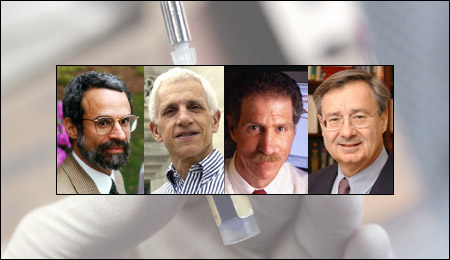Four Harvard Medical School researchers part of $300 million NIH center for HIV research consortium

Four Harvard Medical School (HMS) faculty will serve in leadership roles within the Center for HIV/AIDS Vaccine Immunology (CHAVI), a consortium of universities and academic medical centers established today (July 14) by the National Institute of Allergy and Infectious Diseases (NIAD). The center’s goal will be to solve major problems in HIV vaccine development and design. Barton Haynes, a professor at Duke University Medical Center, will head the initiative. CHAVI will receive $15 million in its first year and may receive more than $300 million in the next seven years, according to the National Institutes of Health (NIH). CHAVI’s mission is to address major obstacles to HIV vaccine development and to design, develop, and test novel HIV vaccine candidates. The award transforms HIV research in the United States into a cooperative and collaborative system.Two of the four senior scientific leadership positions will be filled by Norman Letvin, HMS professor of medicine at Beth Israel Deaconess Medical Center; and Joseph Sodroski, HMS professor of pathology at Dana-Farber Cancer Institute. Along with Haynes, these leaders will be responsible for the overall scientific work conducted by CHAVI. They will direct CHAVI research in their own labs and may also form research partnerships between CHAVI and other academic and industrial labs around the world.Three of the five research core activities will be filled by Stephen Harrison, HMS professor of biological chemistry and molecular pharmacology and of pediatrics at Children’s Hospital Boston and Harvard Medical School; Raphael Dolin, HMS dean for academic and clinical programs and professor of medicine at Brigham and Women’s Hospital and BIDMC; and Letvin. Stephen Harrison will lead the structural biology core, Raphael Dolin will lead the clinical core, and Letvin, also a scientific leader, will head the vaccine production core. The NIAID, part of the National Institutes of Health, established CHAVI in response to recommendations of the Global HIV Vaccine Enterprise, a virtual consortium endorsed by world leaders at a G-8 summit in June 2004. The Global HIV Vaccine Enterprise was originally proposed by NIAID Director Anthony Fauci, Haynes, and almost two dozen other prominent HIV vaccine researchers and public health officials in a June 2003 commentary in Science magazine.CHAVI researchers will focus on solving several unanswered questions about HIV, including how it infects the body in its earliest stages; designing, developing, and testing improved vaccines; and evaluating promising HIV vaccine candidates in small-scale clinical trials. CHAVI will also fund a large-scale study to determine how the immune system of the macaque monkey fends off SIV, the macaque equivalent of HIV. Approximately 40 million people are living with HIV/AIDS globally, and the rate of new HIV infections continues to exceed 13,000 per day, according to the Joint United Nations Program on HIV/AIDS. Although AIDS drugs have extended the lives of many in wealthy nations, according to global health experts an effective HIV vaccine would be an extremely valuable addition to the comprehensive prevention strategies necessary to halt the spread of HIV in Africa, Southeast Asia, and Eastern Europe, as well as other parts of the world. In addition to Haynes and the HMS researchers, the CHAVI senior scientific leaders include George Shaw of the University of Alabama, Birmingham, School of Medicine, and Andrew McMichael of Oxford University. The two other core roles will be filled by David Goldstein of Duke University and Myron Cohen of the University of North Carolina, Chapel Hill. CHAVI will be a “virtual consortium” consisting of a collaborative group of scientists at multiple sites – research centers, universities, and companies – around the world. In future years, CHAVI may also solicit and support high-priority new ideas and discovery efforts from the research community.




